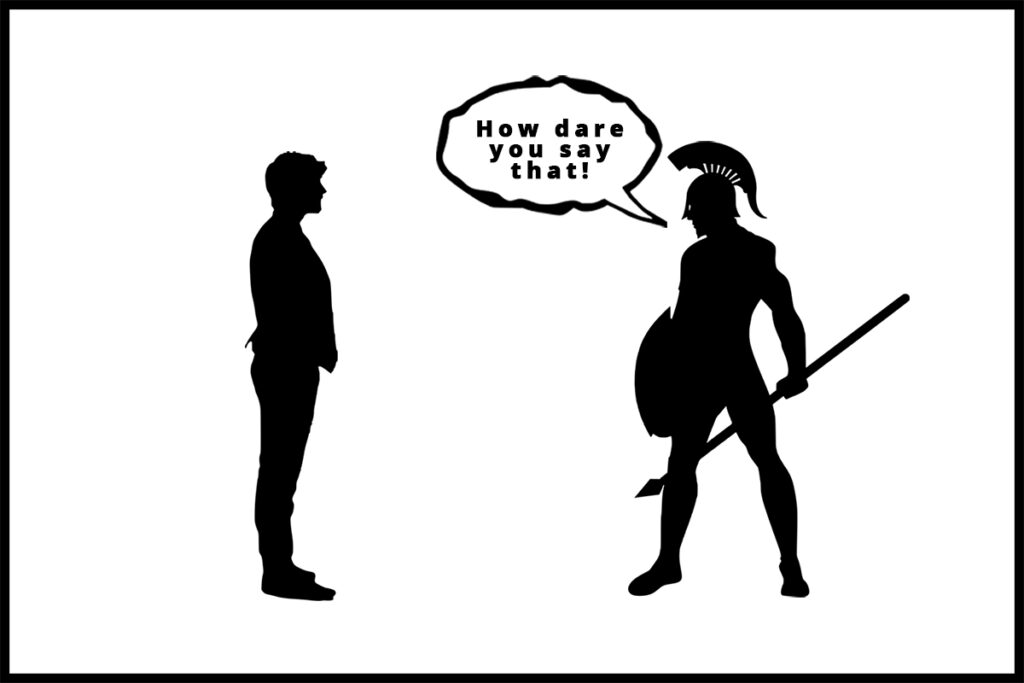
I’ve been noticing more and more how intolerant people have become to hearing a different opinion than their own. This growing inability to handle a different opinion is adding to a more polarized and emotionally charged world, which in turn, is leading to more conflict.
Many people are being attacked (physically and verbally), ridiculed or shamed for having a different opinion or point of view. It’s unfortunate, that as a global community of human beings, we can’t have a simple mature conversation between people who have different opinions and perspectives.
It’s unfortunate because without the capacity to have open conversations we’ll continue to be driven apart and feel the need to fight, both as individuals and as a society. As a result, we sacrifice truth, transparency, trust and connection, and instead end up with lies, manipulation, distrust and disconnection.
In this post I’d like to explore why people act like this and then talk about how we can heal conflict by opening to different opinions.
Because a different opinion is not the enemy!
Different opinions are incredible opportunities for growth and connection.
Before we go there, I think it’s important to pause for a moment here and ask the question, what kind of a world do you actually want to live in?
Because if we don’t care for values like truth, transparency, trust and connection, then we’ll never strive for it.
But, if we do actually want a more peaceful and connected world, a world where truth, transparency, trust and connection are values we hold together, a world where we can share our thoughts and ideas and welcome those of others because we know it ultimately helps us grow together, then we need to choose such a world… and we do this with our actions.
It starts with understanding and heart.
As Thich Naht Hahn says in one of my favourite quotes:
“Understanding is love’s other name. If you don’t understand, you can’t love.”
Understanding will open our hearts and bring us together.
Understanding Discomfort
Of course, a world where we freely share our ideas and thoughts does not mean we won’t be challenged and made uncomfortable by them. On the contrary, we will be challenged and made uncomfortable. But discomfort is not something to avoid, it’s something we need to understand.
If we try to suppress and censor everything that makes us feel uncomfortable instead of understanding why we feel uncomfortable, we’re running away, or hiding, from the truth. This is true as much on an individual level as it is collectively.
If someone says something we don’t like or agree with, and we feel uncomfortable as a result, yes, it’s easy to blame them for how we feel, but does this help us grow?
No!
Does it create more conflict?
Yes!
Does it disempower us?
Yes
The truth is, we feel the way we do because we react the way we do to the things that present themselves in our lives – other people’s opinions and perspectives are one of those things.
If we blame others for when we feel uncomfortable, frustrated or angry, then do we also blame others for when we feel good?
Following the same line, does this mean feeling good is simply the absence of someone else not making us feel uncomfortable?
Of course not!
If the wind never blew, trees would never establish strong roots. If we never came up against some resistance, we would not become more resilient and stronger, physically, emotionally and spiritually.
Healing and growing can be uncomfortable
When we choose to work on ourselves because we know in our heart, we can be a better version of our self, then we will have to face things about ourselves that will make us uncomfortable. We’ll have to face our fears, emotions, traumas, beliefs and attitudes – the things that make us act and react the way we do. We have to face things about our self that we don’t naturally want to face.
The discomfort we sometimes feel when we hear a different opinion can actually be putting us in touch with these parts of us.
I was extremely shy as a young child all the way through primary and high school. It was very uncomfortable when the attention was on me, so I really didn’t like being in front of anymore than a few people. Being in front of a classroom or any kind of public speaking felt torturous for me.
I could have simply avoided those situations, and for a very long time I did… until I didn’t. If I’d never put myself in positions of discomfort, public speaking for example, I would never have followed my inspiration to create the Peacekeeper Project… or this post you’re reading now.
Why do we attack instead of trying to understand?
Often because we feel threatened.
So, why would someone feel so threatened by someone else’s opinion or perspective?
Great question!
It‘s important to understand this, both in ourselves and in others (remember, “understanding is love’s other name”)
If a mother cat is with her kittens and she feels threatened by another animal or a person, she might attack.
Attacking someone when we feel threatened is a natural reaction, or an instinct.
But that doesn’t mean it’s right.
It doesn’t mean it’s wrong either.
It’s not about judging, it’s about understanding why we react the way we do, which helps us grow in emotional intelligence and resilience, so that ultimately we can choose how we act. Remember, if we want a more peaceful and connected world, one with truth, transparency, trust and connection, then we need to choose it with our actions.
So how does this relate to attacking someone for what they say?
It’s the same principle. We feel threatened.
In the face of a different opinion, our sense of self can feel so threatened that at some level (mostly subconscious, unless we become aware of it) we perceive it as if we’re under attack… and so we attack back.
Our sense of self, or our little ego, is that familiar sense of how we feel and know our self. It’s made up of beliefs and attitudes (among other things) about all kinds of things – some which were given to us from our parents and society, and others we’ve learned through a lifetime of personal experiences.
Beliefs have limits
Sometimes we don’t even realize we believe something until someone says something to the contrary – and then sometimes, before we know it, we’re fighting for it… Without even realizing why we believe what we believe.
It’s not that having a belief is right or wrong, but it is important to understand that when we identify so strongly with those beliefs, if someone presents a different opinion or perspective it can feel like threat or an attack on our sense of self… and in this state of mind we don’t care to understand what they’re actually saying, instead we just attack… because it’s more uncomfortable to listen to their words.
At a certain level, this can feel like threat to our life. Because to open to that different opinion, or new piece of information, would mean that some part of us needs to die. Of course, it’s not a physical death, but in the moment, it may feel like fighting for your life. But in reality it’s really just fighting to maintain attachment to a familiar sense of self.
“If you fight for your limitations, you get to keep them.” – Jim Kwik
When we’re too identified with a belief system we simply don’t know our self without it – so, to even consider a different idea or belief means we have to let go of the limits of our current beliefs… which means to let go our current sense of self.
A death of sorts. A death of limitations… if we allow it.
The discomfort and challenge that comes with it is relative to how open we are to new ideas.
Different opinions are an opportunity to break limits!
This post is not to try and tell you what you should or shouldn’t believe, it’s to help you break the limits of who you think you are, so you can awaken to who you truly are… and then bring a little more understanding and love into the world.
So, now that you understand a little more of this behaviour of attacking someone because we don’t like or agree with their opinion, it’s time to apply it. There’s a lot of this happening out in the world, but we can’t expect others to stop this behaviour if we can’t do it ourselves.
And we’ve all done it before at some level. Maybe someone close to you said something you didn’t like, so you insulted them or called them stupid. Even if it was only in your mind, it’s the same principle – there was a reaction inside you towards that person’s words.
So, let’s make sure we’re not contributing to this kind of conflict ourselves.
It’s also important to understand the people we witness doing it, because when we don’t understand others, we tend to see the culprit as separate from ourselves – us and them.
Refraining ourselves from behaving like this but still judging those who do, is not enough!
We can transform judgement through understanding.
We’re all going through this human experience together, whether we’re aware of it or not. Understanding will help us feel the underlying connection to our fellow humans, whatever state they’re in.
Remember:
“Understanding is love’s other name. If you don’t understand, you can’t love.”
How to allow different opinions help you grow
Start by noticing how it makes you feel when you hear an opinion or idea you don’t like or believe in yourself.
Do you feel tension or heat in your body?
What emotions do you feel?
Does it make you frustrated, sad or infuriated?
Do you start making degrading remarks about the person who said it (even if only in your mind)?
Remember not to judge what you notice. Just observe and take note. What are you learning about yourself?
Notice as much as you can of what’s happening inside you (body and mind).
How open or closed are you to the opinion or idea?
Notice the feeling of resistance.
Can you feel the sense of threat or a feeling of wanting to fight?
Paying attention to what’s happening inside you in response to hearing opinions and ideas you don’t like or agree with helps you recognize your limits.
Ask yourself questions like:
Why am I getting so upset?
Why am I reacting this way?
What am I threatened by?
Noticing it is the first step where we make our unconscious limits conscious. But then at some point we need to choose to act differently.
This doesn’t mean you now have to suddenly agree with what someone else has said. Sometimes this will happen, but sometimes it won’t. When you open to hear what they actually said you might realize that they have a great point or some very valuable information that ultimately helps you grow.
Our search for truth can happen together when we share different ideas and perspectives. Instead of taking things too personally and reacting to it, take a line of truth. What could this different perspective show you?
The power of understanding
Understanding has the power to bring us together.
Even though you might not like or agree with what someone has said, can you try to understand it from their perspective?
Be curious about them.
What are they actually saying?
Why do they say what they say?
Why do they believe what they believe?
What emotions are they experiencing?
Remember, you’re not judging them or their words, you’re just trying to understand.
Understanding is a bridge that connects us to each other.
If you feel yourself reacting and getting upset about what someone has said, seek to understand. Feel how the act of understanding shifts your state of mind and softens your heart.
Feel the tension in your body soften as you expand beyond your limits.
Courage
It takes courage to face our unconscious behaviours and emotional reactions. But in stepping into it we help heal the conflict inside ourselves, which in turn ripples out into the world healing conflict collectively.
Be courageous and lead from your heart.
…



